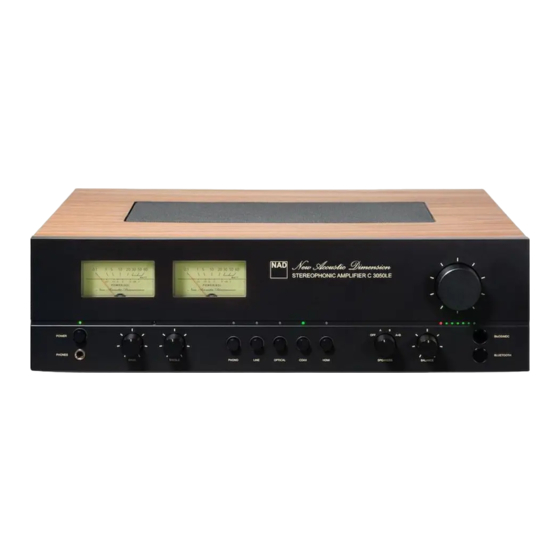
Table of Contents
Advertisement
Advertisement
Table of Contents

Summary of Contents for NAD C 3050
- Page 1 C 3050 ® Stereophonic Amplifier Owner’s Manual...
- Page 2 IMPORTANT SAFETY INSTRUCTIONS • Read instructions - All the safety and operating instructions should be read • Damage Requiring Service - Unplug this product from the wall outlet and refer before the product is operated. servicing to qualified service personnel under the following conditions: •...
- Page 3 To ensure compliance, operations at closer than this distance is not recommended. IF IN DOUBT CONSULT A COMPETENT ELECTRICIAN. NAD® is a trademark of NAD Electronics International. NAD Electronics International is a division of Lenbrook Industries Limited. ©NAD, All Rights Reserved...
-
Page 4: Table Of Contents
INTRODUCTION TABLE OF CONTENTS IMPORTANT SAFETY INSTRUCTIONS INTRODUCTION WHAT’S IN THE BOX ..........5 FACTORY RESET . -
Page 5: Introduction
• Should water get into your C 3050, shut off the power to the unit and remove the plug from the AC socket. Have the unit inspected by a qualified service technician before attempting to use it again. -
Page 6: Identification Of Controls
• The volume, tone and balance controls are operative for The C 3050 is at network Standby Mode by default or after factory reset. If headphone listening. there is no user interface interaction and no active source input within 15 •... -
Page 7: Deep Standby Mode
The 12 o’clock position provides equal level to the left and Standby mode. right channels. A detent indicates this position. c At Deep Standby mode, the C 3050 can be switched back to operating • Rotating the control clockwise moves the balance towards the right. -
Page 8: Rear Panel
ATTENTION! Please make sure that the C 3050 is powered off or unplugged from the mains power source before making any connections. It is also advisable to power down or unplug all associated components while making or breaking any signal or AC power connections. -
Page 9: Mdc2 Upgrade Slots
Connect this +12V TRIGGER OUT to the other equipment’s corresponding +12V DC input jack using a mono cable with 3.5mm male plug. • This output will be 12V when the C 3050 is ON and 0V when it is either OFF or in standby mode. -
Page 10: Sr 10 Remote Control
Select AMP from the DEVICE SELECTOR buttons to initiate the following C 3050 remote control commands. 1 ON/OFF: The SR 10 remote has separate ON and OFF buttons. Press ON to switch C 3050 from Standby to operating mode. Press OFF to switch to Standby mode. - Page 11 IDENTIFICATION OF CONTROLS SR 10 REMOTE CONTROL CD PLAYER CONTROL (applicable to NAD CD Players): Select CD among the DEVICE SELECTOR buttons to gain access to the following applicable control buttons. Check the owner’s manual of your applicable NAD CD Player for control button compatibility.
-
Page 12: Using The Sr 10 Remote Control Library
USING THE SR 10 REMOTE CONTROL LIBRARY The SR 10 can store a different library of default NAD codes for each of its DEVICE SELECTOR “pages. ” If the original default library does not control your NAD CD player, BluOS player or Tuner, follow the procedure below to change the library code. -
Page 13: Reference
REFERENCE SPECIFICATIONS All specs are measured according to IHF 202 CEA 490-AR-2008 standard. THD is measured using AP AUX 0025 passive filter and AES 17 active filter. PREAMPLIFIER SECTION LINE INPUT, PRE-OUT (Analog bypass on) THD (20 Hz – 20 kHz) <0.005 % at 2V out Signal-to-Noise Ratio >95 dB (IHF;... - Page 14 **** - Gross dimension includes feet, volume knob and extended front and rear panel terminals. Specifications are subject to change without notice. For updated documentation and features, please check out www .NADelectronics .com for the latest information about C 3050.
- Page 16 All rights reserved. NAD and the NAD logo are trademarks of NAD Electronics International, a division of Lenbrook Industries Limited. No part of this publication may be reproduced, stored or transmitted in any form without the written permission of NAD Electronics International.
















Need help?
Do you have a question about the C 3050 and is the answer not in the manual?
Questions and answers